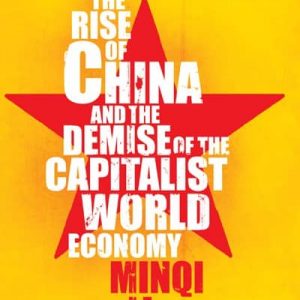Could the rise of China fatally de-stabilize capitalism?
Aug 15, 2012
by Systemic Disorder
The world is not limitless, yet growth without limits is touted as a permanent economic elixir. But natural resources aren’t infinite, nor can demand be infinite. What happens when the limits of growth are reached?
We aren’t supposed to ask that question about capitalism; the assumption is that economic activity will always grow. The insertion of China into the world capitalist system has created the opportunity for more growth as a country of 1.3 billion people has been thrown open to the world’s markets.
But what if, rather than throwing capitalism a lifeline in the form of a vast pool of consumers who will drive demand, China instead will fatally destabilize an already weakened world economic system?
China will be the final straw that will bring about the downfall of the capitalist system is the provocative conclusion of an interesting book by a Chinese economist, Minqi Li, who now teaches at the University of Utah. Professor Li doesn’t pull any punches in his book; indeed his book’s title is The Rise of China and the Demise of the Capitalist World Economy.* The book’s central thesis is that the huge mass of low-wage Chinese workers will drag down wage levels globally; the increase of industrialization in developing countries will lead to exhaustion of energy sources; and that ecological limits will force a halt to growth, fatal to a system dependent on growth.
Professor Li believes that the combination of these crises will bring an end to the capitalist system by the middle of this century. The Rise of China, however, is not apocalyptic; rather it methodically builds it case piece by piece through a sober examination of economic trends, calculations of the limits to a range of natural resources, analysis of long-term environmental unsustainability, and study of historical trends going back centuries. Nor is this a bleak work; Professor Li writes in the Gramscian spirit: pessimism of the intellect, optimism of the will. What will follow the collapse of capitalism is not pre-ordained but is up to humanity to determine.
The first two of the book’s seven chapters provide an interesting discussion of Chinese history, before and after the 1949 revolution. Pro-capitalist factions within the Chinese Communist Party gained the upper hand soon after Mao Zedong’s death in 1976, with Deng Xiaoping wresting party leadership by the end of the decade. Early reforms granting concessions to workers and peasants cemented political control for the Deng faction, Professor Li writes, enabling the party to then introduce capitalism. A 1988 law granted enterprise managers full control in the workplace (including hiring and firing at will), and the development of market relations enabled privileged bureaucrats to enrich themselves….
Read the entire review on Systemic Disorder

Comments are closed.